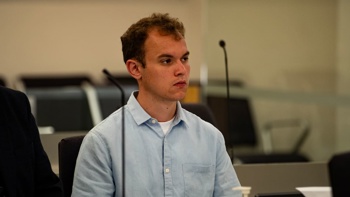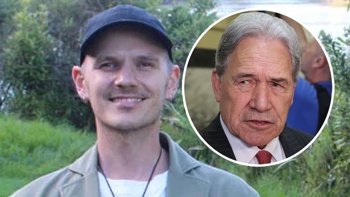Covid cases over summer could peak at 11,000 cases and 100 hospital admissions a day, health officials say.
Authorities have also lowered the age of eligibility for a second Covid booster for Māori and Pacific Islanders to 40 and above.
Deputy director general of health Dr Andrew Old said during a live update at Middlemore Hospital in Auckland on Wednesday that after four weeks of steady increases the past two weeks had seen Covid cases plateau.
He said hospitalisations are increasing, however.
He said the BA.5 Omicron sub-variant still accounted for the majority of cases.
Old said the outlook for summer with more people travelling and a mix of new variants is “uncertain”.
Modeling shows cases over summer could peak up to over 11,000 cases a day and 100 hospital admissions a day, Old said.
the infection rates recorded in July during the Omicron second wave.
“If you’re due a booster my message for you today is book it in before you go on holiday,” said Old.
He is reminding Kiwis that if they get the virus that staying home is the most effective to stop it spreading.
- ‘High attack rate’: Northland on watch after cruise ship visits with Covid-19 outbreak
- Cambodian PM tests positive for COVID after hosting summit
He is advising those going away on holiday to have a kit with RATs and medicine.
Old said reinfections make up 20 per cent of new cases.
Three factors will dictate the future of Covid-19 in New Zealand - waning population immunity, new variants and behaviour, he said.
Old said an expected increase in cases mixed with uncertainty of variants in the community means we need to keep an eye on the ball.
“The recent increase in cases reminds us that we are not out of the woods yet,” said Old.
Old said he is not familiar with the BN.1 variant seen in the United Kingdom, but was familiar with a new strain in Australia.
Town said Pzifer and Moderna have developed BA.1 and BA.5 vaccines and are watching these closely.
/cloudfront-ap-southeast-2.images.arcpublishing.com/nzme/CDAEKBCJDFDKVLNGCX5QBKHBQI.jpg)
Deputy director general of health Dr Andrew Old. Photo / Jed Bradley
The increase in Covid cases is a reminder to remain vigilant, said Te Whatu Ora Interim National Medical Director Dr Pete Watson.
He said the health system is continuing to experience ongoing pressure.
At Middlemore there are 280 people in hospital longer for seven days he said.
Watson said they are working on strengthening hospital discharge to relieve pressure on emergency departments.
Watson said health systems across the world were still coming under pressure due to Covid-19.
He said the virus, coupled with winter illnesses and staff shortages, has been particularly difficult.
Watson said they are training those who stepped up to work in the Covid-19 vaccination programme to enter the workforce
He said they are also focusing on training more doctors.
He said over 1900 health workers have applied to work in New Zealand under new immigration programmes set in July.
Watson reminded to call Healthline if they are unsure of how urgent their condition is, and that simpler conditions were better treated by GPs.
“In coming months we are likely to see a high prevalence of Covid-19, but we will get through like we always have,” Watson said.
Ministry of Health Chief Science Advisor said 650,000 people have received their second booster.
“A big shout out to New Zealand who are getting ready for summer and are getting their booster,” he said.
Māori and Pacific Islanders aged 40 and above from Friday were eligible for a second booster, Town said.
He said the recommendation has been made because these groups are at higher risk of getting the virus and being hospitalised.
/cloudfront-ap-southeast-2.images.arcpublishing.com/nzme/SJVHIS6K6ZE3HFQCME2GIYL3XU.jpg)
Ministry of Health Chief Science Advisor Dr Ian Town. Photo / Jed Bradley
Earlier today the parliamentary health select committee, meeting to look at extending Covid-19 regulations, heard an alternative to the Government’s MIQ allocation system for overseas New Zealanders was yet to be finalised, despite the High Court ruling in April that the system had operated “unjustly”.
It has prompted concerns New Zealand would not be ready to utilise an improved framework should MIQ be required in the future.
It was also confirmed those who had been disadvantaged by the allocation system had the option to seek compensation with the Crown.
The allocation system, also known as the MIQ lottery system, was implemented to allow Kiwis overseas to book a room to isolate or quarantine in on their return to New Zealand to reduce the chance of Covid-19 transmission.
The system faced regular criticism for its inability to effectively prioritise those most in need of returning to New Zealand.
One of the most reported cases was that of journalist Charlotte Bellis, who was initially refused an emergency MIQ spot, despite being stuck in Taliban-controlled Afghanistan while pregnant. She was eventually granted an emergency spot after mounting public pressure.
/cloudfront-ap-southeast-2.images.arcpublishing.com/nzme/KZGEZLDGMKDCSPNNLDJOGUCINA.jpg)
Charlotte Bellis while pregnant in Afghanistan. Photo / Jim Huylebroek
In April, the High Court found that the MIQ system didn’t allow for individual circumstances to be considered and prioritised, and examples of extreme delays were not prioritised.
Justice Jillian Mallon said the Government had failed to show why an online system couldn’t have prioritised New Zealand citizens or those who had faced significant delay.
“The emergency allocation process as it operated was an inadequate method of seeking to ensure that New Zealanders could return if they were facing unreasonable delays or had a need to return that warranted priority,” she said in April.
“It was inevitable that the system would operate unjustly in some individual cases because of this.”
Covid-19 Response Minister Dr Ayesha Verrall appeared before the health select committee this morning to argue the case for continuing the Covid-19 Public Health Response Act through to May 13, 2023.
In responding to a question from National Party health spokesman Dr Shane Reti, Verrall said April’s court ruling did not include another “obvious solution” to the “very difficult” problem posed by MIQ allocations and policy work was ongoing in that area.
“We do continue to have officials working on preparedness for any future variants and incorporating the findings of the court into how a future allocation system might work,” she told committee members.
“The search for a better solution is one that needs to continue to be worked on should it ever be needed again.”
Covid-19 Response Minister Dr Ayesha Verrall. Photo / Mark Mitchell
Reti, speaking to the Herald after the committee meeting, said the apparent lack of progress was disappointing.
“If things start to progress and we need to activate closed borders, that policy needs to be in place.
“Would we prioritise for essential services, would we prioritise for illness, would we prioritise family over tourists? None of this is epiphanous and one would have thought that work was already done before the [High Court] case was concluded, but it’s clearly not complete here today.”
Reti believed a new system should be developed with full public input through an expedited select committee process to ensure it was completed quickly.
In the circumstance a MIQ allocation system was required immediately, it was understood the system found to be unjust would not be re-introduced in its same form.
In a Quarantine and Isolation Capability Readiness Plan, published by the Ministry of Business of Innovation and Employment in August, it said the system’s functionality would be reviewed to ensure it was “in line with recommendations at the end of MIQ”.
During the committee meeting, Reti asked Verrall what options people had to seek compensation from the Government if they had been disadvantaged by the MIQ allocation system.
/cloudfront-ap-southeast-2.images.arcpublishing.com/nzme/2VI2TQB47BELLSM5GF3SM7DD4A.jpg)
National health spokesman Dr Shane Reti. Photo / Mark Mitchell
One of Verrall’s advisors indicated compensation claims could be raised individually with the Crown.
Reti, speaking to the Herald, said he had been contacted by a person whose citizenship had been compromised by their inability to return to New Zealand after leaving to attend to a sick relative and being unable to secure a MIQ spot.
He said the person’s predicament was currently being presided over by Immigration New Zealand but should they not be successful, Reti indicated he could assist them through the pathway referenced by Verrall’s advisor.
Speaking to New Zealand’s current Covid-19 situation, Verrall said the situation remained uncertain, given the mix of subvariants observed globally.
She referenced the 21,595 new cases from the past week, but noted a potential slowing in the rate of increase of cases.
Take your Radio, Podcasts and Music with you

/cloudfront-ap-southeast-2.images.arcpublishing.com/nzme/ZZ6U422O5FEYLGSFRVTYOVSQII.JPG)








